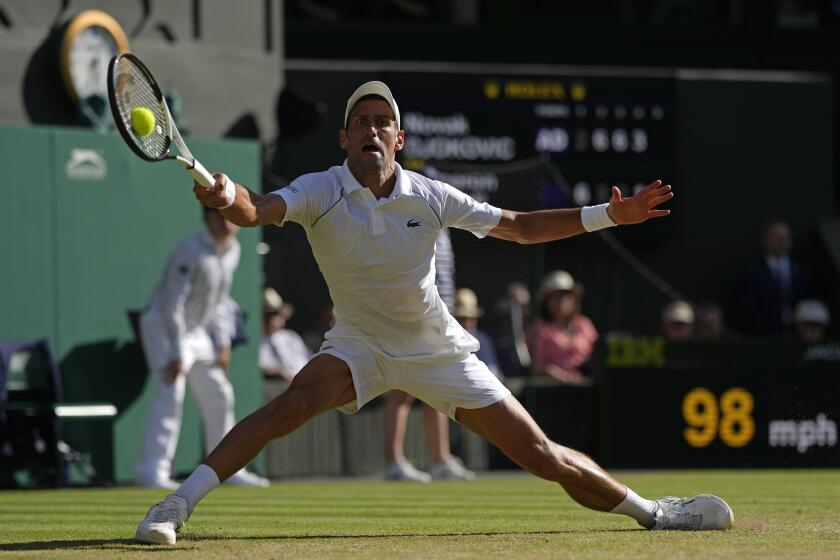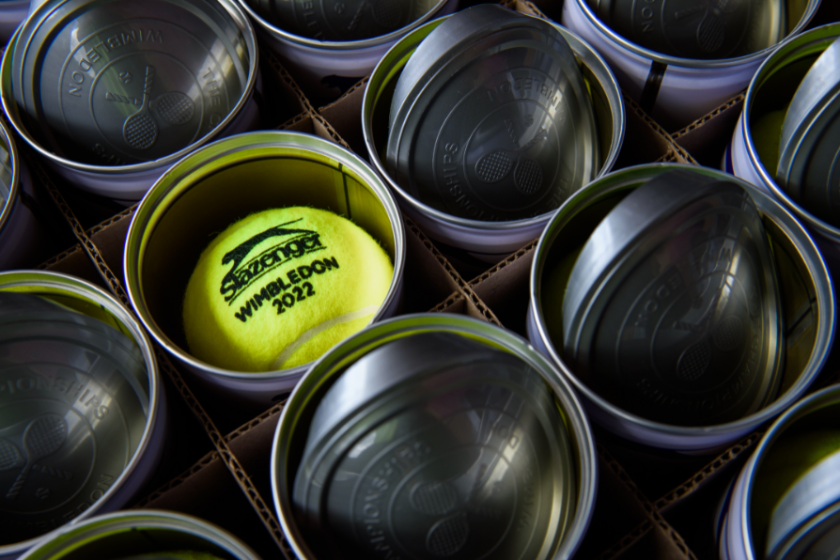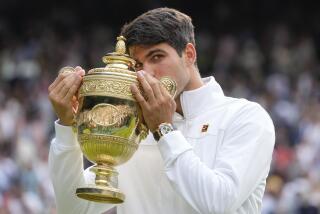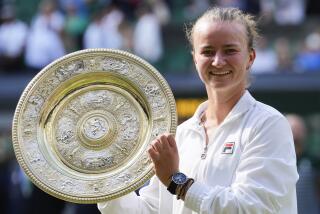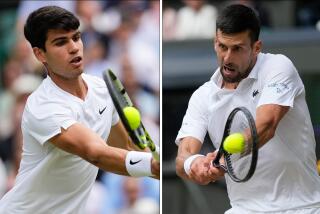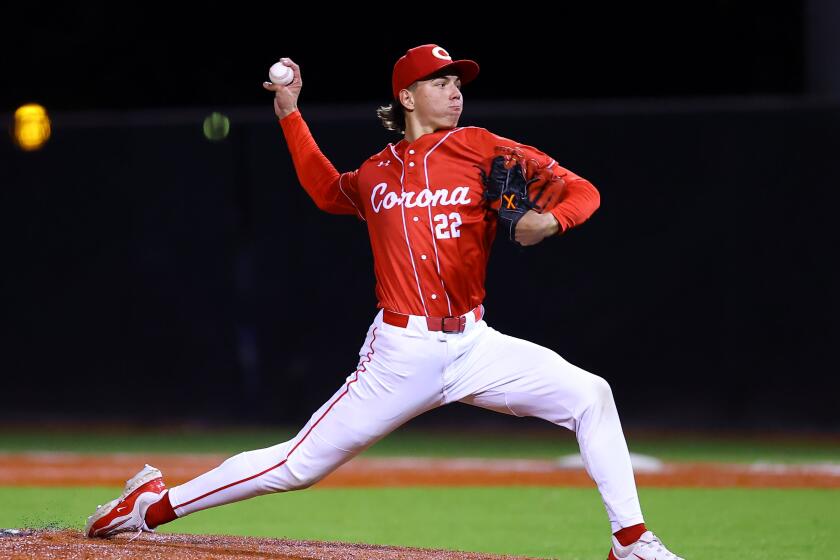Elena Rybakina defeats Ons Jabeur for Wimbledon women’s title
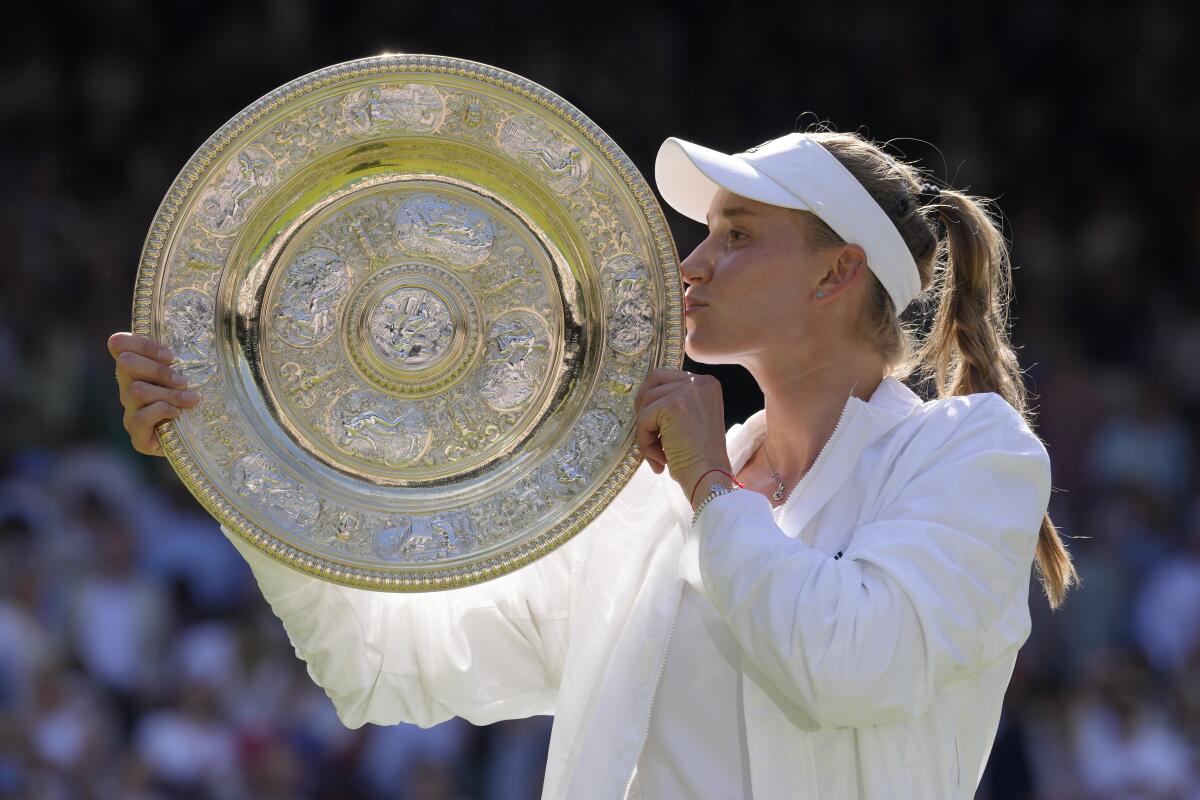
- Share via
WIMBLEDON, England — The return sailed wide, and it was over. Game, set, match. Elena Rybakina had won the Wimbledon women’s singles title on Saturday, the youngest champion in more than a decade.
Her matter-of-fact expression didn’t change. She dabbed her face with her wristband, shook the hand of vanquished Ons Jabeur, briefly patted her racket as if applauding, and raised her hand in thanks to the crowd at Centre Court. She had won 3-6, 6-2, 6-2. Ho-hum. It all appeared so routine.
It wasn’t, of course. Rybakina, 23, later conceded she didn’t expect to make it out of the first week of the Wimbledon fortnight. She began the tournament as a 100-to-1 shot. The shy 6-footer who lives in Moscow but four years ago became a citizen of Kazakhstan — a wildly fortunate decision — is known for keeping her emotions in check. Yet they were percolating inside.
“I’m always very calm, so … ” she said later. “When I was giving speech in the end I was thinking, `I’m going to cry right now,’ but somehow I hold it. Maybe later when I’m going to be alone in room I’m going to cry nonstop.”
That even-keeled exterior seemed to help her against the more experienced and far more emotive Jabeur, known in her native Tunisia as the “Minister of Happiness.” Adding a layer of import to her performance, she was the first Arab woman to reach a Grand Slam final.
“It’s nice to play against Elena, to be honest with you,” said Jabeur, 27. “Even when you lose against her, she didn’t do any big celebration or anything. … ”
Novak Djokovic beat local favorite Cameron Norrie on Friday and will face Nick Kyrgios in the men’s singles final at Wimbledon.
Then, easing into that Minister of Happiness grin, “I need to teach her how to celebrate really good.”
Unquestionably, the crowd was behind Jabeur, she of the winsome personality and generous spirit. Two days earlier, when she won her semifinal match, she coaxed her opponent back onto the court to share in the applause. She embraced her place in history. And the energy pulsed through Centre Court, where the royal box guests included Tom Cruise and several past women’s champions.
“It’s really amazing to see a lot of fans, not just from Tunisia but from the Arab world,” said Jabeur, whose final came on the same day her country was celebrating the holiday of Eid al-Adha. “I know a lot of Muslims during me playing wishing me a happy Eid — even when I was serving. It was really amazing to have them.”
Rybakina’s background isn’t as well known, except that she was born in Moscow but decided four years ago to become a Kazakh citizen when the ministry of tennis offered to provide her more support than Russia. That turned out to be a wise move for her. Wimbledon barred competitors from Russia and Belarus this year in the wake of Russia’s invasion of Ukraine. It was a cosmic irony that a woman who lives in Russia would wind up winning.
“From my side, I can only say that I’m representing Kazakhstan,” she said. “I didn’t choose where I was born. People believed in me. Kazakhstan supported me so much. Even today I heard so many support. I saw the flags.”
To win, Rybakina had to buck an overwhelming trend. In the last 14 Wimbledon finals, the woman who won the opening set wound up winning the title. That wasn’t the case Saturday as Rybakina relaxed, settled into her game and used her booming serve and remarkable mobility to take control.
“She started to be more aggressive,” Jabeur said. “I think she stepped in the court much more and put a lot of pressure on me. That I didn’t find a solution for, unfortunately, today.”
A key sequence came in the third set, with Rybakina ahead 3-2 and serving. Jabeur built a 40-love advantage but was unable to break Rybakina’s serve, losing the next five points.
The thousands of balls used every year at Wimbledon might look identical to most, but they can have big differences from a player’s perspective.
“She played with calm and clarity, never rushed and used her best shots to regain her footing,” ESPN tennis commentator Chris Fowler said. “Those five points told us a lot about who she is as a player. Her very muted reaction to winning an improbable title told me a lot about who she is as a person.”
Whereas Rybakina capitalized on four of her six break-point opportunities (67%), Jabeur converted just two of 11 (18%).
“She played most of the break points really well,” Jabeur said. “I had to accept it. I couldn’t do more. I really tried. Deep inside I really tried everything that I can.”
That included trying everything she could to encourage herself.
“I was telling myself, like, `This is not over. I trust you,’” she said. “I even said, `I love you’ to myself during the match.”
Whereas Rybakina is the youngest Wimbledon singles champion since 21-year-old Petra Kvitova in 2011, Jabeur seemed to hear the ticking clock more acutely. The background screen of her phone is the Venus Rosewater Dish, the trophy that Rybakina ultimately lifted as champion.
“Apparently, I should have put the other one,” Jabeur said with a smile, referring to the runner-up trophy. She later joked that it was time to once again use a picture of her niece as the background.
In truth, this was another step toward where she wants to be.
“Definitely huge step for me,” said Jabeur, whose previous best in a Grand Slam was reaching the quarterfinals of the Australian Open. “I want to be a top-five player. I want to win more titles. I want to win a Grand Slam. Almost there, at the last step.”
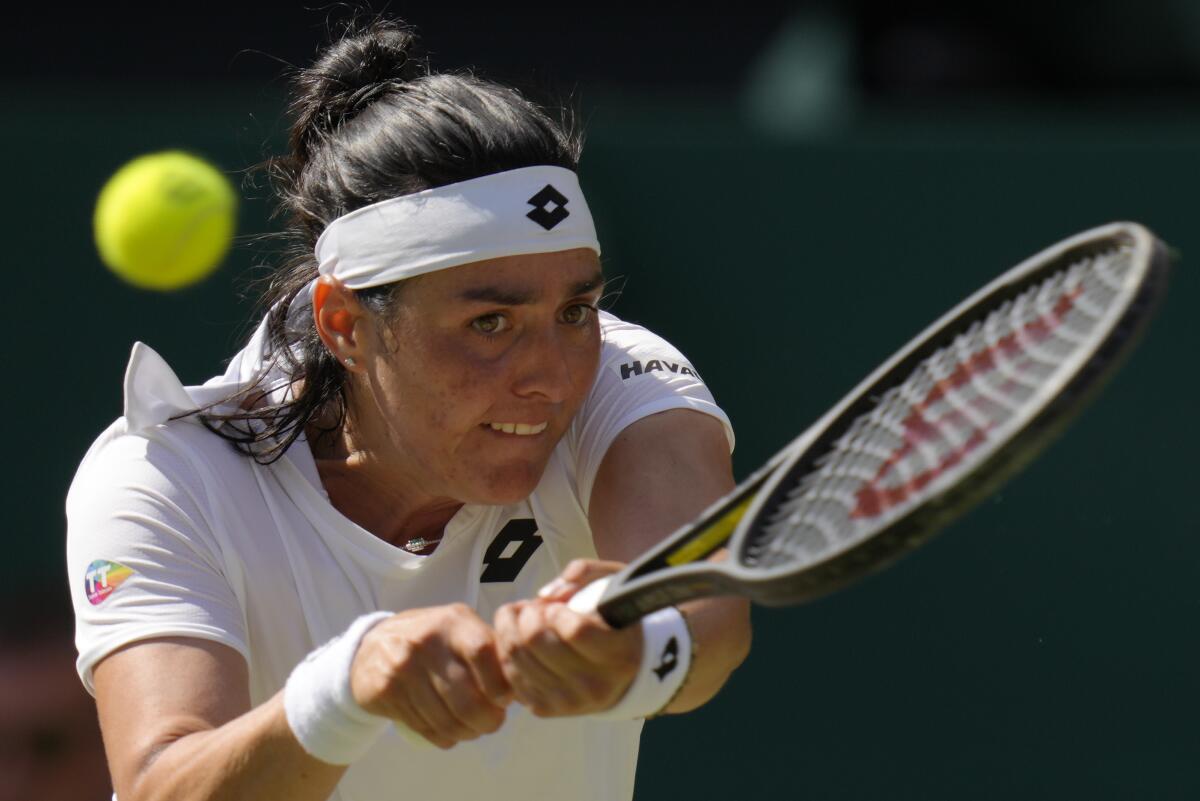
Rybakina is there. But her parents weren’t there to see it, nor were Jabeur’s, who did not have time to apply for a visa. The Kazakh star on a meteoric rise was asked during her news conference what she thought the reaction of her parents would be.
Rybakina’s cheeks went flush. Her eyes filled with tears. She covered her face with her hand.
“Probably they’re going to be super proud,” she said.
“You OK?” the moderator asked softly.
“Yes,” Rybakina said, dabbing her eyes. With a little laugh that caused her shoulders to shake she added, “You wanted to see emotion.”
More to Read
Go beyond the scoreboard
Get the latest on L.A.'s teams in the daily Sports Report newsletter.
You may occasionally receive promotional content from the Los Angeles Times.

